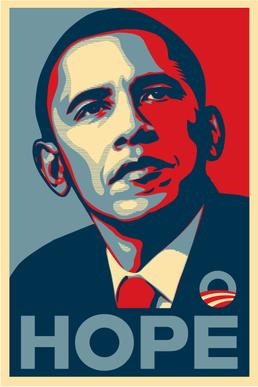Should we have hope? It seems like an absurd question. You might even say that the questioner is despondent and miserable. But, let us take a moment and examine the issue of hope.
We are told hope keeps our aspirations alive. Hope is what gets us through difficult times. Hope is the flame that gives us the energy to move on. It appears to be a beautiful thing. People who have hope are far better than people who don’t – we call such people ‘hopeless’. In fact our mainstream media and our common culture idealize hope. President Barack Obama was widely seen as a harbinger of ‘Hope’.  This poster was most widely distributed in the run up to the presidential elections nine years ago. Our movie film makers are no different. We all remember Shawshank Redemption and that incredible scene where Andy Dufresne (played by Tim Robbins) breaks out of Shawshank. The scene is riveting. Many of us watch the movie to reaffirm the thought that hope is that which we need to keep alive in us till the very end.
This poster was most widely distributed in the run up to the presidential elections nine years ago. Our movie film makers are no different. We all remember Shawshank Redemption and that incredible scene where Andy Dufresne (played by Tim Robbins) breaks out of Shawshank. The scene is riveting. Many of us watch the movie to reaffirm the thought that hope is that which we need to keep alive in us till the very end.

But there is a darker side of hope which we need to recognize. Hope simply means this – ‘The present is not satisfactory and therefore we invest everything in us to make the future much brighter’. The concern with this type of thought process is that it assumes that the universe is deterministic. That is, the results that we seek is directly related to the amount of effort and ingenuity we put in. We all know that is far from the truth. Effort is paramount to achieve anything, but so is providence. Remember the talented kid from school who was sure to be a scientist, but failed miserably in life sound all too familiar to us? Or our own family members who had lofty goals as young and passionate people, but now look back and laugh at where they are. The humour always hides a hint of cynicism.
What if we ask ourselves this question? What would have happened if Andy Dufresne was caught before he broke out? Can we just stop, take a breath and think of what his emotional state of mind would be? All that planning. All the hope – vaporized. What, then would he rely on to push himself forward? It’s a poignant yet very realistic question and makes us realize this. Hope is only beautiful if the thing we hoped for happens. If not, it can be very destructive. I’ve seen so many older people around me who seem so negative and dejected in life. I hear a common phrase, “I gave up so much for my family, for my children, for my company – and I have got nothing in return’. They were obviously waiting for a payday. It just never came. And now they have nothing to look forward to.
This just might be us – fast forward into the future. But we certainly don’t want to end up there. So what do we do?
I think the problem with hope is that it is linked to a goal – a goal in the distant future. It precludes us from enjoying the moment. This is the classic tenet of Hindu philosophy and the Gita. Don’t be attached to the goal, just do you action. But how do we exist when we don’t have goals? All our modern life, including our relationships is goal driven. We are taught to achieve. People who have no goals are losers in life. I think that this thinking is what is creating such tremendous psychological stress on us and our relations. For tens of thousands of years in the history of man, there were no goals. Yes, there were desires – you had to hunt the deer and collect enough food before winter set in. Or you had to grow adequate crops for the family. These were existential desires that had to be fulfilled. They never asked themselves, “Where do I want to be in 10 years time”.
This whole western thought of a goal oriented life has meant that we do things only because we gain something at the end. It’s purely transactional. We never do things cause we enjoy doing it. For a musician like me, it translates to this difference,
“I learn music so that I can master Debussy’s Claire de Lune”
or “I learn music because I love playing Debussy’s Claire de Lune”
The difference may seem inconsequential but it makes a world of difference. One is rooted in the end result and the other in the process. We have for too long been caught up in activities that promote goal oriented living. As India’s foremost poet, bard, composer and Nobel Laureate Rabindranath Tagore has so eloquently written,
“Child I have forgotten the art of being absorbed in sticks and mud-pies”
We need to spend time doing things that are not goal oriented. Life itself has no goal. It is a zero sum game. So the next time you paint – just paint. The next time you meet a friend – just be with that person and not worry about why you need to meet that person. The next time you go to the woods – just be with nature and not worry about the number of species that exist in the forest. And as we spend time enjoying the things we do, we slowly begin to come in contact with that part of us that is beyond hope and despair. And in that innermost, core of our existence – we care not for hope, we care not for the future. Love dawns in us and time comes to a standstill. We become, in a little way – immortal.


This also explains why it is difficult to meditate sometimes. The moment we start expecting or hope for an outcome from meditation, the process becomes burdensome. The goal seems to become unattainable when actually there is no goal. It’s that simple – Praying is talking while meditating is listening, just being! Therefore, anything done with love, with genuine curiosity or simply by just being with the process becomes meditation. Isn’t it?
That’s exactly my experience. The process is the key and not the end result. This is why sometimes we meditate best after a guided meditation ends.